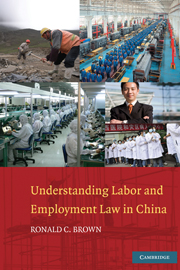Book contents
- Frontmatter
- Contents
- Preface
- Acknowledgments
- Understanding Labor and Employment Law in China
- PART I UNDERSTANDING CHINA'S REGULATION OF THE WORKPLACE
- PART II EMPLOYMENT RELATIONSHIPS
- 3 Employment Relationships
- 4 Individual Labor Contracts: Formation and Content
- 5 Collective Labor Contracts and Collective Negotiations
- PART III HIRING AND EMPLOYMENT PRACTICES
- PART IV WORKING CONDITIONS, WAGES, AND HOURS
- PART V EMPLOYEE BENEFITS: LEAVES, MEDICAL, MATERNITY, WORK-RELATED, UNEMPLOYMENT, AND PENSION INSURANCE
- PART VI DISCIPLINE AND TERMINATION UNDER EMPLOYMENT AGREEMENTS
- PART VII RIGHTS, REMEDIES, AND MULTIPLE FORUMS
- Appendix
- Index
- References
3 - Employment Relationships
Published online by Cambridge University Press: 22 January 2010
- Frontmatter
- Contents
- Preface
- Acknowledgments
- Understanding Labor and Employment Law in China
- PART I UNDERSTANDING CHINA'S REGULATION OF THE WORKPLACE
- PART II EMPLOYMENT RELATIONSHIPS
- 3 Employment Relationships
- 4 Individual Labor Contracts: Formation and Content
- 5 Collective Labor Contracts and Collective Negotiations
- PART III HIRING AND EMPLOYMENT PRACTICES
- PART IV WORKING CONDITIONS, WAGES, AND HOURS
- PART V EMPLOYEE BENEFITS: LEAVES, MEDICAL, MATERNITY, WORK-RELATED, UNEMPLOYMENT, AND PENSION INSURANCE
- PART VI DISCIPLINE AND TERMINATION UNDER EMPLOYMENT AGREEMENTS
- PART VII RIGHTS, REMEDIES, AND MULTIPLE FORUMS
- Appendix
- Index
- References
Summary
Introduction
Workforce Profile
Labor force demographics show dramatic distinctions among workers in China based on many factors, including location (urban/rural and region), occupation and skills, and employers (domestic/foreign/SOEs; see Table 3.1).
Employment Relationships
In China, defining “employer” and “employee” and their employment relationship for the purposes of delineating legal rights and duties has become more important in recent years. The 1994 Labor Law sought inclusive language for “employees/workers,” but workplace realities produced many categories, including “dispatch” workers; independent contractors; managers and supervisors; and migrant, temporary, part-time, and de facto workers. An issue facing China's drafters of new labor laws was how each subsequent labor law would be applied (or not applied) to these categories. Likewise, employer designations under the labor laws produced some uncertainties, as they too came in a variety of forms.
Defining the employment relationship for purposes of coverage under China's legal system often requires a two-step examination of the national and local laws to determine the proper “operating law” at the level of application. This is due to China's decentralized system, in which the central government passes broad, general legislation and leaves to the local governments the responsibility of promulgating “detailed implementing regulations” to apply the national laws. Coverage by the labor laws may also be determined on a geographical basis rather than by the employment relationship. That is, the distinction between urban and rural may be determinative.
- Type
- Chapter
- Information
- Understanding Labor and Employment Law in China , pp. 23 - 35Publisher: Cambridge University PressPrint publication year: 2009



